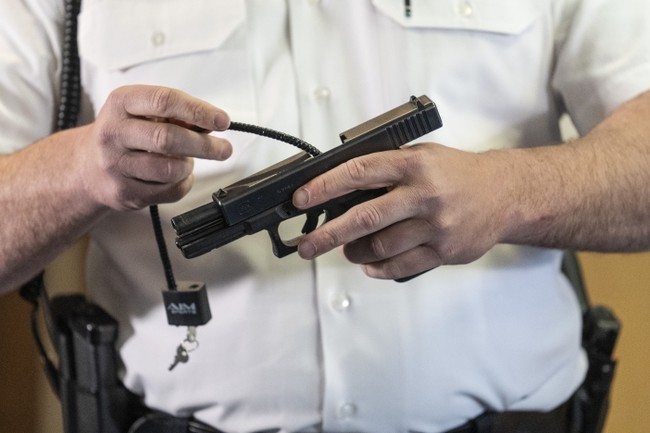Former Republican Michigan Rep. Mike Rogers is highlighting growing momentum in his campaign to flip a key Michigan Senate seat red during the midterms — after receiving President Donald Trump’s endorsement.
Rogers said the president’s early support for his campaign gives Republicans the best shot at winning the seat vacated by retiring Democratic Michigan Sen. Gary Peters which Democrats have held since 1979, during an exclusive interview with the Daily Caller News Foundation. The two-time Senate candidate is arguing that Trump’s endorsement and backing from national GOP groups will allow him to consolidate a winning coalition of voters in advance of the general election — while his eventual Democratic competitor is likely to emerge weaker after a messy primary fight. (RELATED: John Thune Shares His ‘Big, Beautiful’ GOP Sales Pitch For The Midterms)
“It [the president’s support] opens up the lane for us to build the ‘mother of all ground games,’” Rogers told the DCNF in a recent interview discussing the state of the race, including the campaign’s ambitious outreach efforts. “This [endorsement] allows us to focus on that, which is targeted at beating Democrats next year, and not targeted at fighting amongst ourselves, which is huge.”
Rogers, the former chair of the House Intelligence Committee who came within 20,000 votes of being elected to the Senate in 2024, is making the case that unified Republican support and a divisive Democratic primary will give him a crucial leg up as he works to win one of the most closely-watched races of the midterms. Republicans view the open Michigan seat as one of their best pathways to expand to grow their 53-seat majority and Rogers argues the early enthusiasm behind his campaign will make him well-positioned to win the seat.
Republican Michigan Rep. Bill Huizenga’s decision to pass on a run and the president’s endorsement effectively clears the field for Rogers to advance to the general election. Trump did not endorse Rogers during his first Senate run until March 2024 after battling in a contentious primary contest, giving the Michigan Republican a roughly six month head start during his 2026 campaign.
The president and his team are reportedly focused on recruiting the strongest candidates in key races to maintain Republicans’ majorities in both the House and Senate during the midterms. Chris LaCivita, a co-chair of Trump’s 2024 presidential campaign, is also serving as a senior advisor to the campaign.
“He [Trump] knows if he loses the House or the Senate, you know, the thought of every day being conflict — it just isn’t productive,” Rogers told the DCNF.
Senate Majority Leader John Thune, who endorsed Rogers’ campaign immediately after his entry into the race, told the DCNF in an interview on July 23 that recruiting “quality candidates” was a part of his strategy to flip winnable seats in 2026. Rogers also has the backing of the National Republican Senatorial Committee, Senate Republican’s campaign arm, who is expected to spend aggressively in support of his campaign.
Rogers said he would welcome the president traveling to Michigan to campaign with him. The Michigan Republican also told the DCNF that he looks forward to touting the tax relief and manufacturing provisions within Trump’s One Big Beautiful Bill Act, which Rogers argues will be an economic boon to his state.
“He [Trump] wants people that share his belief that America can be a manufacturing powerhouse again, and those jobs ought to be here in America,” Rogers said while emphasizing that he would support the president’s legislative agenda if elected to the Senate. “I’m looking forward to him coming back [to Michigan] and having him join our narrative about a Michigan renaissance of manufacturing.”
(L-R) Former US President and Republican presidential candidate Donald Trump looks on as Mike Rogers, US Senate candidate from Michigan, speaks during a campaign rally at the Ryder Center for Health and Physical Education at Saginaw Valley State University in Saginaw, Michigan, October 3, 2024. (Photo by Jim WATSON / AFP) (Photo by JIM WATSON/AFP via Getty Images)
Rogers is quick to mention several unique factors in the race that make him well-positioned for a general election showdown, which were not present during his prior run.
There is the state’s open gubernatorial race, which history suggests may flip to Republicans next year. Incumbent Democratic Michigan Gov. Gretchen Whitmer is term-limited in 2026, and Michigan’s three previous governors were all succeeded by someone of the opposing party. Rogers said the open Senate and gubernatorial races are likely to be a huge motivator for Republican voters who want to take control of the state’s top elected positions.
Rogers also highlighted the Senate race’s divisive Democratic primary, which appears to have no clear frontrunner, according to recent polling.
The contest is between Democratic Rep. Haley Stevens, a favorite of the Democratic Party establishment, left-wing state legislator Mallory McMorrow — who leads the primary field in fundraising — and Abdul El-Sayed, the Bernie Sanders-endorsed candidate.
“It is messy, and getting messier by the day. And I love it,” Rogers said, reflecting on his own primary battle last cycle. “They’re gonna have to fight their way through all of that, and that means they’re going further and further to the left.”
“And we get to actually be for Michigan working families,” Rogers continued. “That’s the difference — and we get an extra six or eight months to do that.”
As the Democratic candidates run to the left to vie for the party’s nomination, Rogers has roughly 15 months to focus on motivating voters to turn out in support of his campaign.
The Michigan Republican had notably not entered the race at this point during the previous election cycle. Rogers announced his first Senate bid in September 2023.
Rogers said the campaign has already surpassed its timeline for setting up a ground game effort with more than 100 campaign co-chairs in counties across the state. The campaign will continue to expand its volunteer infrastructure and is planning a variety of outreach efforts, including to disaffected Democratic voters who he believes will reject the ultimate Democratic candidate’s policy agenda, according to the Michigan Republican.
“There’s a little more enthusiasm on a warm Saturday in late July on a Saturday morning — you don’t expect a lot,” Rogers said following a campaign stop in Sparta, Michigan, outside of the Grand Rapids metro area.
“We probably had 75 people show up,” Rogers continued. “It was great.”
All content created by the Daily Caller News Foundation, an independent and nonpartisan newswire service, is available without charge to any legitimate news publisher that can provide a large audience. All republished articles must include our logo, our reporter’s byline and their DCNF affiliation. For any questions about our guidelines or partnering with us, please contact [email protected].
Read the full article here







![Socialist NYC Mayoral Candidate Mamdani Faces Two Criminal Investigations [WATCH] Socialist NYC Mayoral Candidate Mamdani Faces Two Criminal Investigations [WATCH]](https://www.lifezette.com/wp-content/uploads/2025/09/2025.09.07-11.38-lifezette-68bd6ebc4e391.jpg)



